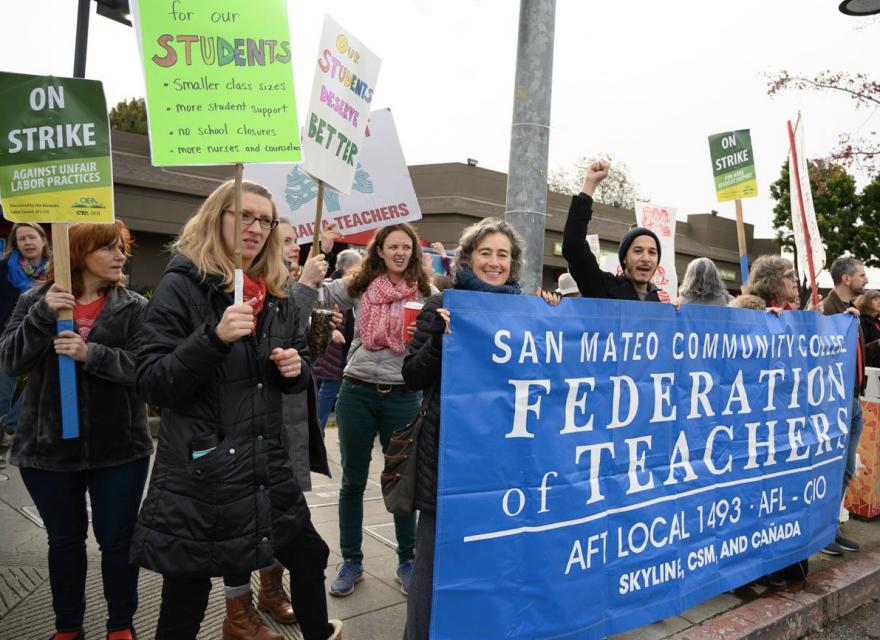FIRST PERSON | By Katharine Harer
I joined the picket lines in Oakland on three different mornings. On the first day of the strike, teachers brought a boom box and we danced and sang on the line. Another day, at a different school, a parent brought a folding table and fed us tangerines, string cheese, mountains of cinnamon and chocolate croissants and hot coffee.
At every picket site, every school, I met teachers, parents, grandparents, children and people like me, teachers from community colleges, as well as students from UC Berkeley. I met a retired Oakland teacher who was happy to be done with teaching but excited to join the strike. I met an unhappy man with a dog who, as we peeled tangerines over a garbage can together, told me he just wanted to get back to his students. He just wanted to teach.
On the corner of Telegraph and Alcatraz, near Peralta Elementary, a mom brought her son to visit his teacher on the picket line. The teacher’s face melted when she saw her student walking toward her. When he spotted his teacher, he grinned, showing all his missing teeth. A little later I saw nearly the same thing with another teacher and another child. This boy had a mouthful of braces that glistened when he smiled. When his teacher saw him, she stopped chanting and waving her sign and sang out his name: “Joshua!”
I saw a group of fourth grade girls standing in a tight circle with their teacher chanting: “Oakland teachers love their students! Oakland students love their teachers!” I had forgotten how much raw love exists in elementary school between good teachers and their students. As a community college teacher, I can tell when my students like and appreciate me, but their smiles are more careful, they have all their adult teeth, and most of the time they keep their emotions tucked inside.
During the Oakland strike I became a connoisseur of horns. Vehicles, big and small honked their horns when they saw us holding our signs. Trucks honked. Buses and maintenance vehicles honked. Ubers and Lyfts honked. School bus divers and garbage trucks honked. The rhythms of honks varied like jazz riffs: one quick toot, a series of sharp toots, the exciting hand-hard-on-the-horn blare, and the mightiest of all, a succession of long, loud blares.
There were fog-horn-deep horns that reminded me of the low barks of big dogs and squeaky beep-beeps like the yaps of Chihuahuas. My favorite horn was from a complicated looking maintenance vehicle – a big thing with more big things hanging off it. Its horn was long and loud and had a faraway sound, almost like a freight train. I smiled and cheered. A woman standing next to me said, “Now that’s a great horn!”
The people honking for us were a multitude – old, young, all colors and cultures: women in veils and women in suits; working guys in overalls; young parents and grandparents; cars with children in them, honking and waving. Nearly everyone showed their support, and we’d raise our arms in the air to wave or make a fist and shake our strike signs up and down. And then they’d do it again, and we’d wave some more. It was a conversation, a community chorus, call and response.
The first day of the strike was especially cold, and my nose was running. I imagine many noses were running that morning. A neighbor who lived across from the school we were picketing offered her house for bathroom use, and my friend, Jessica, went across the street to use the facilities. She emerged from the lilac colored house holding a big box of tissues, and when I reached in and grabbed a few, they were warm. “Her house is so warm,” Jessica said. “You should go. She’ll make you tea.”
I never did go to the lilac colored house, but I treasured the woman’s gift, her kindness, and stuffed my coat pockets with her tissues. I learned that solidarity can be the music of horns and a box of warm Kleenex.
Katharine Harer is Co-Vice President of the San Mateo Community College Federation of Teachers, AFT Local 1493


